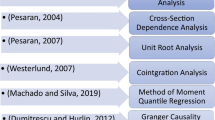Abstract
In this digitalized world, economies have energetically encouraged green transformation. The empirical findings regarding the nexus between human capital and green growth are relatively inconclusive. The study originally explores the effect of human capital on the green growth of a digital economy like China from 1991 to 2019. To investigate the model empirically, we have applied the ARDL technique. Our results indicate that there is a positive impact of different levels of education on the green growth of China in the long run. Regression results also show that renewable energy consumption, internet use, and financial development lead to expansion in green growth in the long run. Our findings can strengthen the belief of the Chinese government on the advancement of green growth.
Similar content being viewed by others
Availability of data and materials
The datasets used and/or analyzed during the current study are available from the corresponding author on reasonable request.
Change history
20 December 2022
A Correction to this paper has been published: https://doi.org/10.1007/s11356-022-24812-w
References
Acemoglu D, Aghion P, Bursztyn L, Hemous D (2012) The environment and directed technical change. Am Econ Rev 102(1):131–166
Acemoglu D, Akcigit U, Hanley D, Kerr W (2016) Transition to clean technology. J Polit Econ 124(1):52–104
Bahmani-Oskooee M, Akhtar P, Ullah S, Majeed MT (2020a) Exchange rate risk and uncertainty and trade flows: asymmetric evidence from Asia. J Risk Financ Manag 13(6):128
Bahmani-Oskooee M, Usman A, Ullah S (2020b) Asymmetric impact of exchange rate volatility on commodity trade between Pakistan and China. Global Business Review, 0972150920916287
Barro R (1996) Health and economic growth, Mimeo. Harvard University, Cambridge, MA
Barro RJ, Lee JW (2001) International data on educational attainment: updates and implications. Oxf Econ Pap 53(3):541–563
Chankrajang T, Muttarak R (2017) Green returns to education: Does schooling contribute to pro-environmental behaviours? Evidence from Thailand. Ecol Econ 131:434–448
Devaraj S, Kohli R (2000) Information technology payoff in the health-care industry: a longitudinal study. J Manag Inf Syst 16(4):41–67
Fankhauser S, Sehlleier F, Stern N (2008) Climate change, innovation and jobs. Clim Policy 8(4):421–429
Gylfason T (2001) Natural resources, education, and economic development. Eur Econ Rev 45(4–6):847–859
Hall BH, Helmers C (2010) The role of patent protection in (clean/green) technology transfer (No. w16323). National Bureau of Economic Research
Jian L, Sohail MT, Ullah S, Majeed MT (2021) Examining the role of non-economic factors in energy consumption and CO2 emissions in China: policy options for the green economy. Environ Sci Pollut Res 28(47):67667–67676
Khan MA, Ozturk I (2020) Examining foreign direct investment and environmental pollution linkage in Asia. Environ Sci Pollut Res 27(7):7244–7255
Lei W, Xie Y, Hafeez M, Ullah S (2022) Assessing the dynamic linkage between energy efficiency, renewable energy consumption, and CO2 emissions in China. Environ Sci Pollut Res 29(13):19540–19552
Lei W, Ozturk I, Muhammad H, Ullah S (2021) On the asymmetric effects of financial deepening on renewable and non-renewable energy consumption: insights from China. Economic Research-Ekonomska Istraživanja, 1–18
Li X, Ozturk I, Majeed MT, Hafeez M, Ullah S (2022a) Considering the asymmetric effect of financial deepening on environmental quality in BRICS economies: Policy options for the green economy. J Clean Prod 331:129909
Li X, Ozturk I, Ullah S, Andlib Z, Hafeez M (2022b) Can top-pollutant economies shift some burden through insurance sector development for sustainable development? Econ Anal Policy 74:326–336
Li X, Ullah S (2021) Caring for the environment: how CO2 emissions respond to human capital in BRICS economies?. Environ Sci Pollut Res 1–11
Li X, Shaikh PA, Ullah S (2022c) Exploring the potential role of higher education and ICT in China on green growth. Environ Sci Pollut Res 1–8
Mahalik MK, Mallick H, Padhan H (2021) Do educational levels influence the environmental quality? The role of renewable and non-renewable energy demand in selected BRICS countries with a new policy perspective. Renewable Energy 164:419–432
Mankiw NG, Romer D, Weil DN (1992) A contribution to the empirics of economic growth. Quarter J Econ 107(2):407–437
Marshall A, Marshall MP (1920) The economics of industry. Macmillan and Company
Meyer A (2015) Does education increase pro-environmental behavior? Evidence from Europe. Ecol Econ 116:108–121
Neves PC, Sequeira TN (2018) Spillovers in the production of knowledge: A meta-regression analysis. Res Policy 47(4):750–767
Ozturk I, Ullah S (2022) Does digital financial inclusion matter for economic growth and environmental sustainability in OBRI economies? An empirical analysis. Resour Conserv Recycl 185:106489
Pesaran MH, Shin Y, Smith RJ (2001) Bounds testing approaches to the analysis of level relationships. J Appl Economet 16(3):289–326
Sohag K, Kalugina O, Samargandi N (2019) Re-visiting environmental Kuznets curve: role of scale, composite, and technology factors in OECD countries. Environ Sci Pollut Res 26(27):27726–27737
Sohail MT, Xiuyuan Y, Usman A, Majeed MT, Ullah S (2021) Renewable energy and non-renewable energy consumption: Assessing the asymmetric role of monetary policy uncertainty in energy consumption. Environ Sci Pollut Res 1–10
Ullah S, Apergis N, Usman A, Chishti MZ (2020) Asymmetric effects of inflation instability and GDP growth volatility on environmental quality in Pakistan. Environ Sci Pollut Res 27:31892–31904
Ullah S, Ozturk I, Sohail S (2021) The asymmetric effects of fiscal and monetary policy instruments on Pakistan’s environmental pollution. Environ Sci Pollut Res 28(6):7450–7461
Wei X, Ren H, Ullah S, Bozkurt C (2022) Does environmental entrepreneurship play a role in sustainable green development? Evidence from emerging Asian economies. Economic Research-Ekonomska Istraživanja 1–13
Wong PK, Ho YP, Autio E (2005) Entrepreneurship, innovation and economic growth: Evidence from GEM data. Small Bus Econ 24(3):335–350
Yasmeen R, Padda IUH, Yao X, Shah WUH, Hafeez M (2022) Agriculture, forestry, and environmental sustainability: the role of institutions. Environ Dev Sustain 24(6):8722–8746
Yin J, Zheng M, Chen J (2015) The effects of environmental regulation and technical progress on CO2 Kuznets curve: An evidence from China. Energy Policy 77:97–108
Yin Y, Xiong X, Ullah S, Sohail S (2021) Examining the asymmetric socioeconomic determinants of CO2 emissions in China: challenges and policy implications. Environ Sci Pollut Res 28(40):57115–57125
Yuelan P, Akbar MW, Hafeez M, Ahmad M, Zia Z, Ullah S (2019) The nexus of fiscal policy instruments and environmental degradation in China. Environ Sci Pollut Res 26(28):28919–28932
Zhang D, Ozturk I, Ullah S (2022) Institutional factors-environmental quality nexus in BRICS: a strategic pillar of governmental performance. Economic Research-Ekonomska Istraživanja 1–13
Acknowledgements
1. Key Project of Humanities and Social Sciences of Sichuan Provincial Department of Education: Title: Research on Flexible Response Strategies of Performance Appraisal in Tertiary Public Hospitals in the Context of New Medical Reform, Subject Number: SCYG2019-39.
2. Key Project of Humanities and Social Sciences of Sichuan Provincial Department of Education, Funded by Sichuan Hospital Management and Development Center: Title: Research on the Reform of Salary System in Public Hospitals under the Background of New Medical Reform Based on Equity Theory, Subject Number: SCYG2022-21.
Author information
Authors and Affiliations
Contributions
This idea was given by Daxu Liu. Daxu Liu, Guanzhuo Wang, and Cong Sun analyzed the data and wrote the complete paper. While Muhammad Tariq Majeed and Zubaria Andlib read and approved the final version.
Corresponding author
Ethics declarations
Ethical approval
Not applicable
Consent to participate
I am free to contact any of the people involved in the research to seek further clarification and information.
Consent to publish
Not applicable
Competing interests
The authors declare that they have no conflict of interest.
Additional information
Responsible Editor: Ilhan Ozturk
Publisher's Note
Springer Nature remains neutral with regard to jurisdictional claims in published maps and institutional affiliations.
Rights and permissions
Springer Nature or its licensor holds exclusive rights to this article under a publishing agreement with the author(s) or other rightsholder(s); author self-archiving of the accepted manuscript version of this article is solely governed by the terms of such publishing agreement and applicable law.
About this article
Cite this article
Liu, D., Wang, G., Sun, C. et al. An analysis of the effects of human capital on green growth: effects and transmission channels. Environ Sci Pollut Res 30, 10149–10156 (2023). https://doi.org/10.1007/s11356-022-22587-8
Received:
Accepted:
Published:
Issue Date:
DOI: https://doi.org/10.1007/s11356-022-22587-8




